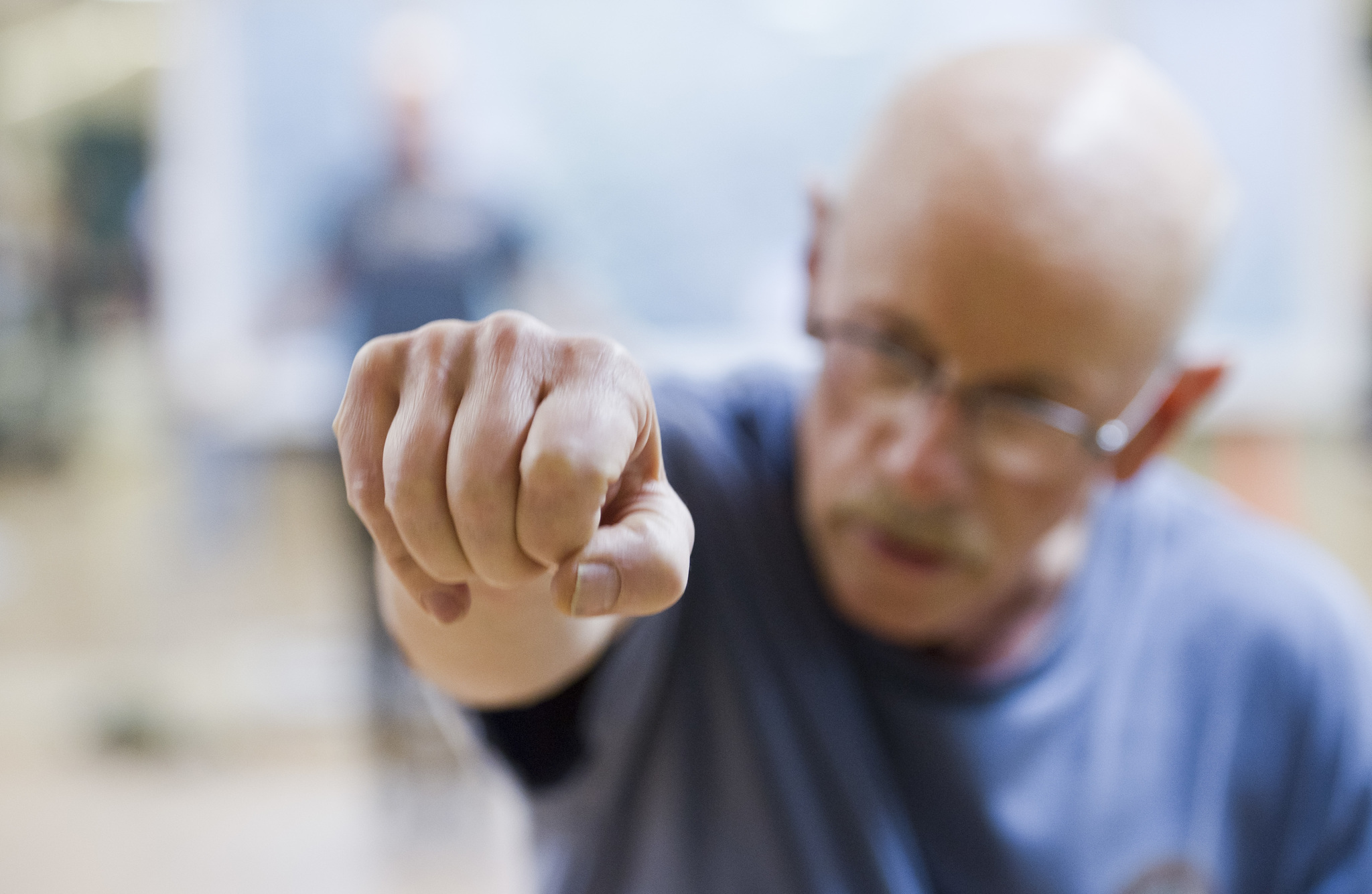Twice a week, seven Juneau residents with Parkinson’s disease go through a transformation.
“Once they go through this door, they are no longer Parkinson’s patients — they’re fighters,” trainer Kirk Burke said.
Inside the upstairs workout room at Pavitt Health and Fitness Center, Luann McVey, whose husband Richard Steele has Parkinson’s disease, led the group of seven participants in yoga to warm them up for “Rock Steady Boxing.”
These “fighters” don’t jump into a ring to square off against another flesh and blood opponent. Instead, they do a circuit of boxing exercises to beat back their real opponent — Parkinson’s.
Parkinson’s is a chronic and progressive movement disorder that affects the nervous system; symptoms are tremors, bradykinesia (slowness of movement), rigidity and postural instability. There are drugs to treat symptoms, but no known cure at this time.
Rock Steady Boxing is a non-contact boxing curriculum designed to help Parkinson’s patients improve their quality of life. There are more than 300 Rock Steady Boxing affiliate programs around the world. Burke went to Indianapolis to train in Rock Steady in September 2016.
“What you’re trying to do is intensify their exercise,” Burke said. “So what happens is, is we’re pushing them to a level that they don’t perceive they can go to. Boxing is great for working both sides of the brain because you’re throwing punches with both hands. It helps with their depth perception, balance, core strength.”
During Rock Steady, the room is set up in stations to practice boxing drills, so a participant has two minutes at a station and one minute to rest before moving on to the next station. Some of the stations are battle ropes, a double-end ball, burpees and suspended push-ups, boxing with a trainer and a punching bag, an obstacle course for footwork, and a weight on a string exercise and hula hooping.
As the class got under way, participants were smiling and drenched in sweat. Burke, Penrose and another Pavitt trainer moved from person to person, correcting their form or giving advice. Spouses, who Burke calls “corner people” like in regular boxing, gave support or kept time.
Twice through the class Burke called out to pump up the participants, “Who are we?”
“Rock Steady!” the class shouted back.
As Steele took his one-minute cool down after the “battle rope” station (battle ropes are huge, heavy ropes boxers move a variety of ways to work on their strength and stamina), he said the station is one of his favorites. Those that require more coordination he finds more challenging.
Steele was diagnosed with Parkinson’s 10 months ago.
“Muscular rigidity and pain,” were Steele’s symptoms, he said. “Muscles tighten up and they just hurt.”
The usual giveaway is the tremor, he said, which is a sign you’re 70-80 percent progressed with the disease.
Steele and McVey learned through a local doctor about Rock Steady Boxing. Steele then visited a class when he went to take part in a non-invasive treatment’s clinical trial for Parkinson’s for two months in Boston.
“The nice thing about Rock Steady is that it helps alleviate some of the problems you have with Parkinson’s, so you’re buying time,” he said.
Steele received the placebo for the clinical trial, but he did see positive effects from Rock Steady Boxing. He wanted to keep up with it when he returned to Juneau, but there wasn’t a single Rock Steady affiliate in the entire state.
Steele, McVey and their friend Kerry Howard, who was diagnosed with Parkinson’s in spring of 2016, decided to bring the program to Alaska.
Rock Steady isn’t something that can be taught in an exercise video, Howard said. To do it right, they needed a trained coach who could teach the class regularly — and money to fund it all. Both Steele and Howard wanted to take the class, not teach it.
McVey, Steele and Howard set up a GoFundMe account, and within a matter of days, raised enough money to send Burke to get trained. Later they sent Nicki Penrose, another physical trainer.
“My symptoms are mild, but I notice after a hard, vigorous class, my tremor is somewhat reduced. I just feel better … I feel stronger … it’s all helping me maintain or improve,” Howard said.
Rock Steady increases endorphins and dopamine, she said, which are critical for Parkinson’s patients because the disease reduces the level of dopamine (a neuro-transmitter linked to many feelings), and those with Parkinson’s can fall prey to depression.
“Our range of symptoms pretty differ, but we all take the same class, do the same exercises and get the same enjoyment and camaraderie out of it,” Howard said.
The class started up in late November, Burke said. They have seven consistent participants coming to the Tuesday and Thursday mid-morning class. Burke said he hopes for more to participate, saying there are other Parkinson patients in Juneau who could benefit. He recently spoke about Rock Steady Boxing at the local Parkinson’s support group that meets the third Tuesday every month at the Pioneer’s Home. People are free to come and try the class out before deciding to regularly attend and get a gym membership.
“Anytime anyone is dealing with any challenge in life, anything that gives you hope is a good thing. I think this Rock Steady Boxing definitely does that,” Howard said.

